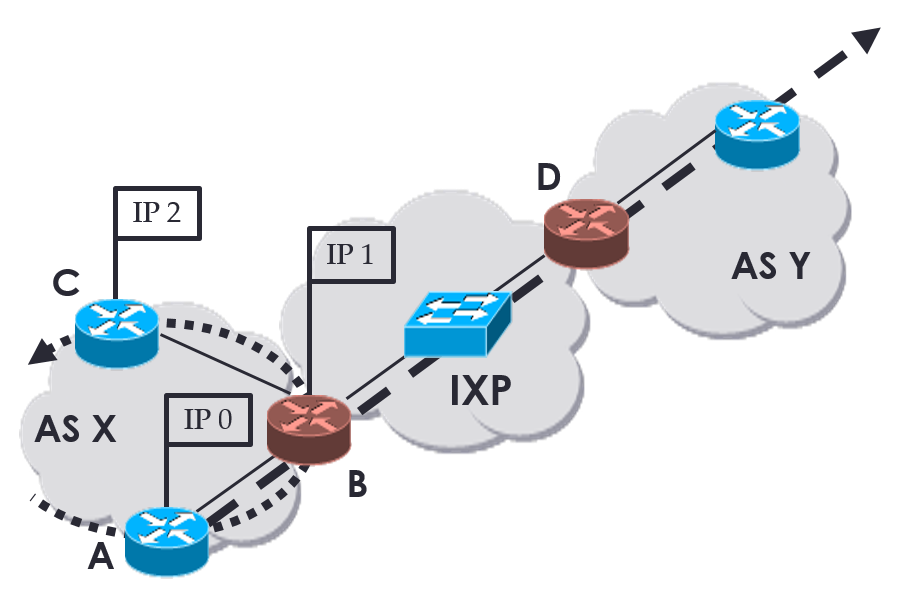traIXroute
Detecting IXPs in Traceroute Paths
traIXroute is a tool that detects if and where a traceroute path crosses an IXP fabric. It uses multiple criteria to verify IXP crossings in the light of replies from third-party interfaces or inaccuracies in the available data about IP addresses assigned to IXPs. These discrepancies mislead simple heuristics based solely on the IP address prefixes allocated to IXPs. The detection uses data from PeeringDB, Packet Clearing House and RouteViews. In addition, traIXroute uses in the background the standard traceroute tool or the scamper tool, which implements the Paris traceroute technique to deal with inaccurate paths due to load balancers [1]. It is open source under GPLv3.

Figure 1: An IXP fabric connected to two ASes. The dashed path crosses the IXP, while the dotted path does not cross the IXP,
although it can yield an IXP address in traceroute replies.
The heuristics used by traIXroute and their evaluation are described in the following paper:
-
G. Nomikos, X. Dimitropoulos. “traIXroute: Detecting IXPs in traceroute paths". In Proceedings of the Passive and Active Measurements Conference (PAM'16) 31 March - 1 April 2016, Heraklion, Greece.
-
G. Nomikos, X. Dimitropoulos. “Detecting IXPs in Traceroute Paths Using traIXroute". RIPE Labs, 3 Aug 2016.
Download
The source code is available in the traIXroute github repository. The first version of traIXroute was released in May 2016.
Installation
traIXroute has been tested on Linux and Mac OS X. Detailed installation instructions can be found in the README file in the traIXroute repository.
The latest version is available on pypi. You can install traIXroute packages running:
IMPORTANT
In case you run Mac OS X, ensure you have installed the Xcode command line developer tools before. To install run:
A software update popup window will appear. You need to install only the command line developer tools by clicking the "Install" button and then agree to the Terms of Service. This process will download and install the Command Line Tools package.
If you have any problems, please contact George Nomikos (gnomikos [at] ics.forth.gr).
Dependencies
traIXroute has the following dependencies:
- Python 3 - traIXroute requires Python 3.4 or Python 3.5.
- PySubnetTree - A Python module for CIDR lookups.
- Scamper - A tool provided by CAIDA for probing the Internet in parallel, so that bulk data can be collected in a timely fashion.
- Traceroute - A diagnostic tool for measuring Internet paths and their per hop delay.
Documentation
traIXroute is thoroughly documented here. The documentation covers the available command line options, how to extend or overwrite the data from PeeringDB and the Packet Clearing House with user-provided data, how to customize or extend traIXroute detection rules, and a diagram of its modules.
Licence
The source code of traIXroute is released under the GNU General Public License, version 3. A license copy can be found in the COPYING file.
Copyright © traIXroute, 2016.
Authors
traIXroute was written by Michalis Bamiedakis (mbam [at] ics.forth.gr), Dimitris Mavrommatis (mavromat [at] ics [dot] forth [dot] gr) and George Nomikos (gnomikos [at] ics.forth.gr) from the INternet Security, Privacy, and Intelligence REsearch (INSPIRE) Group in the Institute of Computer Science of the Foundation for Research and Technology - Hellas (FORTH). The research was supervised by Prof. Xenofontas Dimitropoulos (fontas [at] ics.forth.gr).
Acknowledgements
The research that led to traIXroute was supported by the European Research Council (ERC) Grant 338402 - The NetVolution Project (www.netvolution.eu).
References
[1] Augustin, B., Friedman, T. and Teixeira, R., "Multipath tracing with Paris traceroute." In End-to-End Monitoring Techniques and Services, 2007. Workshop on, pp. 1-8. IEEE, 2007.